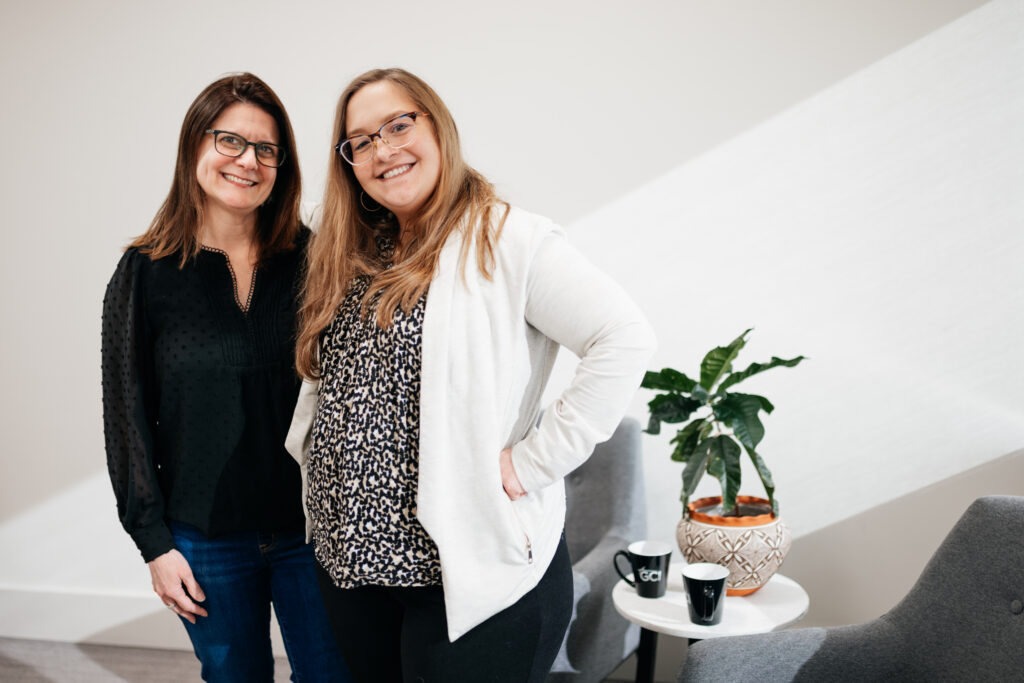March is Women’s History Month, a time to reflect on the strides those who came before us have made toward suffrage, workplace rights, and so much more. We sat down with four leaders at GCI to discuss their journeys and what it means to be a woman in leadership today.

Deborah Ferrell, Senior Director of Diversity, Equity and Inclusion (right)

Paloma Hawn, Senior Manager, Complex Delivery Engineering (right)
When did you first realize you were a role model for other women?
Deborah: I think it started earlier in life for me. I tried out for the cheer team in high school, but all of the uniforms were smaller, and I was a bigger girl. I made the cheerleading squad and then they were like, “Hey, we don’t have any uniforms that fit you; maybe you can’t be a cheerleader.” To which I responded, “Well, maybe I can be a cheerleader, because I can do everything that everybody else does. So, you need to order larger uniforms.” And they actually did. After that, other girls who were larger started trying out and making the squad. It was no longer a thing that you had to be a certain size, you just had to have the skills.
But at work, it was a little different — I don’t think I recognized it until later in my career. Someone came up to me and said, “I just wanted to tell you that I really appreciate who you are, and who you are as a Black, female leader within the company, because it gives us the ability to see somebody like us in that role.” And it really took me aback because being a role model, that position is just so incredibly important. Then I had to think about the intentionality of being a role model and really assess who I was and how I lead and what influence I wanted to have on young women in the company.
Anna: I think my leadership stems from being with this company since I was 20 years old. GCI helped develop me into what I am! Before GCI, I went through a lifetime of what felt like people telling me I couldn’t do something. In the early days of the company, we were able to fill in other people’s roles and other departments when there were vacancies, like someone was on maternity leave, or if somebody was sick. I raised my hand a lot.
I’ve done technician work, and dispatch, and these jobs that women in tech rarely fill. As I moved into a leadership role at GCI, I took it as an opportunity to help mentor and develop other women in the organization. I joined GWeN, which is our internal women’s organization, and went on to become the chair. It’s been so uplifting to be a part of this group and hear other women’s stories — hear what women in tech are experiencing — because this is a very male-dominated industry. And also, to be able to tell my story of how I grew up in this industry, and how I overcame all those “You can’t do its” has been very fulfilling.

Deborah Ferrell, Senior Director of Diversity, Equity and Inclusion (right)
When you began your career, where did you see yourself? How do you feel about sitting here now?
Susannah: When I started college, IT was nowhere on my radar; it wasn’t even a remote possibility. I was hired by a software development company, and one job led to the other, and I just continued to move up the ranks in information technology. Now, I’ve been at GCI for over 20 years. I’ve had a lot of exposure to a variety of things, but always within IT.
Women are right around 28% of the tech workforce and in IT we are trending higher than industry averages at about 29%. We’re also slightly better than industry averages when it comes to women in leadership. GCI IT leadership is approximately 35% women compared to an industry average of about 25% according to 2022 data. I’m pretty happy with that. Different perspectives bring better results at the end of the day.
Paloma: I thought I was going to go to college to be a nurse. My mom is a nurse, and after having some pretty serious discussions with her, she educated me about some of the challenges of that field. Those conversations prompted me to do some other job shadows. I did a job shadow with my dad, who was an engineer for the FAA at the time. He’s a civil engineer and I was bored to death. I had no interest in soil composition, ha! So, I wandered around the FAA office, and I saw a couple guys working on a spectrum analyzer. They were looking for sources of interference around the airport. From then on, I essentially based my entire career off, “I want to play with that spectrum analyzer.” I went to school to get my electrical engineering degree and be a radio frequency (RF) engineer, and that’s what I was hired at GCI to do.

Earn a Scholarship with the GCI Scholarship Program
I was so certain I would never want to be a manager, until I got in the industry. For engineering, women make up only about 14% of the total industry, worse than IT, unfortunately. And we’ve been sitting at that percentage for over 10 years. Through the course of my career, I witnessed how women were treated differently, so when the opportunity came to be a manager, I decided I want to take it and make a difference. Another interesting data point I was reminded about recently is most girls make the decision around third grade that math and science is not for them.
That was certainly my experience — I had no interest in going into a STEM field. It was really just by happenstance I decided to do that job shadowing. It’s really important to explore things maybe you wouldn’t have considered to expose yourself to what’s out there. You don’t know what you don’t know.

Paloma Hawn, Senior Manager, Complex Delivery Engineering (right)
What fears or challenges have you overcome as you’ve worked to establish your reputation?
Anna: For me, it was the fear of negotiating for myself. I heard myself thinking, “I don’t really agree with what’s being offered or what’s being said or what direction we’re going in.” I was afraid — do I say anything? Do I just move forward? Especially when it’s a man in leadership making these calls. Over the years, I’ve learned you can’t be afraid of that stuff. Challenging the status quo is something that is commonly, in my opinion, something women struggle with, and is something that I’ve definitely experienced.
I overcame my fear by doing what I did when I started in sales and was scared — you just put one foot forward and do it. If you don’t ask the question, and you don’t challenge the status quo, then you’re stuck with the status quo. And you have to be okay with that. And if you know you’re not going to be okay with that, or you’re going to be stuck thinking, “What if I did that?” you’ve lost that opportunity. You have to take that opportunity and speak up.
Deborah: For me, there have been a couple of challenges. I’m dyslexic, which can be a considerable hurdle to manage in a fast-paced environment. I am quiet at times. People will be surprised when they read this because it seems so out of character for me. I need a little more time to process things, so I am sometimes quiet. My quietness can give the perception that I’m not engaged, or that I don’t want to be there, but I’m trying to assess the situation and ensure I fully understand what’s happening, so I can take action. Through the years, I’ve implemented strategies that have helped me speed up my thought process to work through situations. And as Anna said, I have the confidence, and I know what I’m doing. I am confident enough to ask for what I need.
When I was young, I was told to go with the flow and to avoid causing problems but to also stand up for myself. When I started to lead and encounter biases, I quickly figured out how to address them, maneuver through the situation, and move forward. It’s critical to stop and point out when something isn’t right. I’ve built myself up in such a way where I can address those types of things, which has made me into the leader I am today.

Deborah Ferrell, Senior Director of Diversity, Equity and Inclusion (right)
How can we as a society ensure we’re amplifying voices and concerns of women in the workplace?
Paloma: I think one is just being vocal and having a platform to discuss those issues. GWeN is a great example of how GCI is amplifying our voices and promoting allyship within the company. If you’re the only person in the room who’s bringing up an issue or a concern, it can be a really lonely experience.
Susannah: I think women should look for opportunities to support other women. Too often, women can be the worst critics of other women. I look at it as your success is my success. When we encourage one another, help each other, reach out to one another, and advance each other to the degree that we can, it advances the whole company for the better.
Paloma: Agree! Men also really benefit a lot from this, too. Parental leave, for example, is something that we recently implemented that also benefits fathers and other people who have family to take care of. There’s historical expectations and gender roles around all the things that really impact men, too, so it’s a cultural reset. Women tend to be really great communicators who bring a lot to the workforce that benefits everybody, regardless of gender identity.

Paloma Hawn, Senior Manager, Complex Delivery Engineering (right)
Interested in working alongside strong female leaders like Anna, Deborah, Paloma and Susannah? Visit here to join the team.